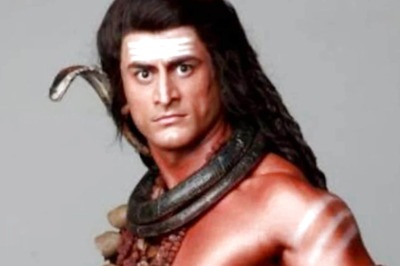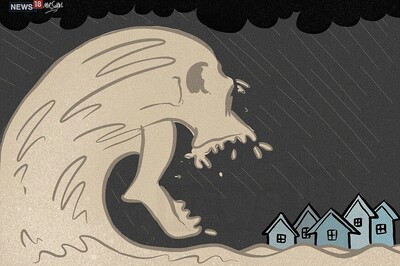
views
Ardmore, Pennsylvania: Under bright sunshine and a gentle breeze, Sergio Garcia signed autographs near the tee box at the 16th hole during his final practice round for the US Open. He then sent his drive in the direction of one of those charming red wicker baskets that sit atop the flagpoles, the white ball coming to rest nicely in the middle of the fairway with nary a smudge of mud.
A postcard scene for golf's return to Merion. Enjoy it while it lasts. For all the extraordinary effort it took to shoehorn a modern-day championship onto the historic but intimate course, there was nothing anyone could do about the 6.5 inches of rain that have soaked the Philadelphia area during the last week. Sunny days on Tuesday and Wednesday helped dry out things a bit, but the weather update from the USGA ominously listed the chance of rain during Thursday's first round at 100 percent.
"Gusty & humid with showers likely in the morning & T-storms in the afternoon," the notice read. That led to a USGA news conference that covered topics like hail, standing water and the dreaded "potentially damaging winds." At one point during a long and otherwise straight-laced opening statement, USGA vice president Tom O'Toole spoke about the presentation of the championship trophy - then rolled his eyes skyward and added: "which we hope will be Sunday."
The forecast also renewed calls for officials to break with U.S. Open tradition and allow players to lift, clean and replace balls in the fairway if the conditions get nasty.
"I would be a fan of being able to clean the mud off," said Matt Kuchar, a two-time winner this year on the PGA Tour. "I think it's one of those really rotten breaks in golf. Driving it in a divot is a rotten break, but most of us can figure it out from there. You drive down the middle of the fairway and you have mud on the ball and you have no idea what's going to happen, you have no real control. It seems like a guy might be rewarded more for missing fairways in those situations, being in the rough, not picking up the mud."
Nice try. But such protestations went nowhere fast.
"We wouldn't be adopting that rule this week," O'Toole said. "And if it was so bad, then the obvious response to that, or consequence, would be we probably wouldn't be playing."
Any major disruption would be a shame, given that the US Open has waited 32 years to return to the course where Olin Dutra overcame a serious stomach illness to win in 1934, where Ben Hogan hit the picture-perfect 1-iron approach to No. 18 before winning in a playoff in 1950, where Lee Trevino pulled a rubber snake out of his bag at the first hole of the playoff when he beat Jack Nicklaus for the title in 1971 and where David Graham became the first Australian to win the trophy in 1981.
It would also dampen the drama of Tiger Woods' pursuit of his first major in five years, a reasonable proposition given that he's already won four times on the PGA Tour this year. And Adam Scott's hopes of becoming the first to win the Masters and US Open back-to-back since Woods in 2002. Weather permitting, Woods, Scott and 2011 US Open champion Rory McIlroy have an early afternoon tee time on Thursday, a grouping of the top three players in the world rankings.
Thought to be too small to host an Open anymore, Merion had been off the radar for so long that many of the top names in the field - including Woods - had never played it until recently. Organisers had to be creative with the placement of hospitality tents and parking lots on the club's relatively small footprint, and ticket sales were capped at 25,000 a day instead of the usual 40,000 or so for recent championships.
But Merion was still expected to provide a quality test, emphasising precision over power in the first major championship in nine years on a course under 7,000 yards.
"I've been reading about how many scoring records are going to be broken," Nick Watney said. "I've been around here once. And I think that's insane. It's funny to me. People look at the yardage and think it's going to be easy. Even if it's soft, the greens are sloped. The rough is thick. OK, we'll have wedges into some of the greens, but that doesn't mean you make birdie on all those holes. There's enough tough holes to counteract that."
There's concern from others, however, that the degree of difficulty might be watered down - literally. "Don't go by what they score here this week," Trevino said, "simply because Merion may not have its teeth in because of the wetness."
Neither did Congressional two years ago, when rains softened the course and yielded McIlroy's record-shattering 16-under 268. That year, USGA officials said repeatedly that even par wasn't their target score for a US Open winner.
They're already in the same mode this week at Merion. "Sure, we want it firm and fast," O'Toole said. "We happen to play a sport that's played outdoors ... So it's not a perfect world."




















Comments
0 comment